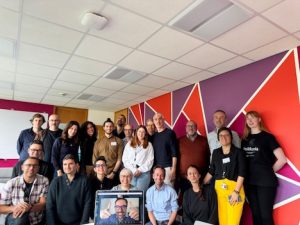News Story
KMi’s Polifonia project Completes Successfully: Unlocking Europe’s Musical Heritage
Thursday 11 Jul 2024
After four years of diligent work, the Polifonia project team, including 10 partners from Italy, the Netherlands, France, England, and Ireland, is proud to unveil the Polifonia Ecosystem, which publishes the complete collection of software and data outputs of the project.
The Polifonia project, led by the University of Bologna (Italy), established Knowledge Graphs as an essential cornerstone for cultural heritage preservation and engagement.
The project yielded an extensive suite of open-source software, datasets, and ontologies. These components, collectively known as the Polifonia Ecosystem, are now available on GitHub, enabling the community to build upon and integrate these tools into their own research and applications.
The Polifonia outputs are designed in close connection with domain experts, musicologists, historians, and the industry, with the objective of supporting serendipitous discoveries, and harmonizing information from various sources to uncover hidden connections within the musical landscape.
Technical coordination was led by Enrico Daga, who also served as the Principal Investigator for the OU. A key aspect of the project was the use of SPARQL Anything for data integration, enhancing the ability to link and access diverse music datasets seamlessly.
The Musical Meetups Knowledge Graph (MMKG), detailed in an ESWC resource paper by Alba Morales, provides a sophisticated tool for historical social network analysis, shedding light on the interconnectedness of musical communities.
Collaboration played a crucial role throughout the project. The work involved contributions from the University of Bologna, the University of Galway, and King’s College London, and utilized numerous datasets including the Listening Experience Database (LED), musoW, the Musical Meetups Knowledge Graph (MMKG), as well as general purpose sources such as Wikidata. The collaboration extended to academics of the FASS Music Department, Helen Barlow, Naomi Barker, and Trevor Herbert, where the Polifonia outputs are explored for novel scholarship as well as for enriching educational experiences.
The Polifonia project also encompassed significant research and development efforts.
Paul Mulholland coordinated the Human-Computer Interaction work package, focusing on multi-modal experiences that mix art and music. His research on Deep Listening aims to create immersive experiences that engage multiple senses. Additionally, workshops with the C&C Music Computing Lab, led by Simon Holland and assisted by Nicholas Canny, explored the use of haptic devices to make music more accessible to hearing-impaired audiences.
The Polifonia Web Portal marks a significant milestone in the accessibility and exploration of Europe’s musical heritage, providing a powerful tool for researchers and enthusiasts alike.
It demonstrates knowledge graphs’ potential to revolutionize the discoverability of Europe’s rich musical heritage, enabling the development of a central hub for music historical data, melodic patterns, chord libraries, and more. Users, ranging from casual enthusiasts to expert musicologists, can now perform comprehensive research across multiple sources with ease.
Polifonia researchers have also made notable academic contributions, publishing papers addressing Semantic Web challenges and issues within Music Information Retrieval. Their work was recognized with the Best Research Paper Award at the Extended Semantic Web Conference 2023 and published in the Scientific Data journal, part of the Nature Portfolio. All research outputs are accessible via Zenodo.
Related links:
- Polifonia Web Portal
- Ecosystem
- Polifonia on GitHub
- Project on Zenodo
- Polifonia_WebPortal_PressRelease_EN_2024-1
Latest News
OU Vice-Chancellor visits KMi: A showcase of Innovation and Impact
Explainable AI study on Education Equity awarded Best Paper at ICAITE 2025
ClimateSense team wins top places in two international misinformation challenges
Assessing the Impact of Artificial Intelligence on the Gender Pay Gap
PhD Awarded for Groundbreaking Research on Game-Based Cyber Security Training

